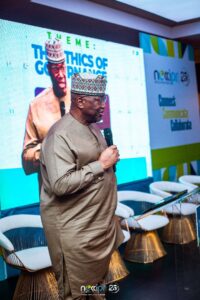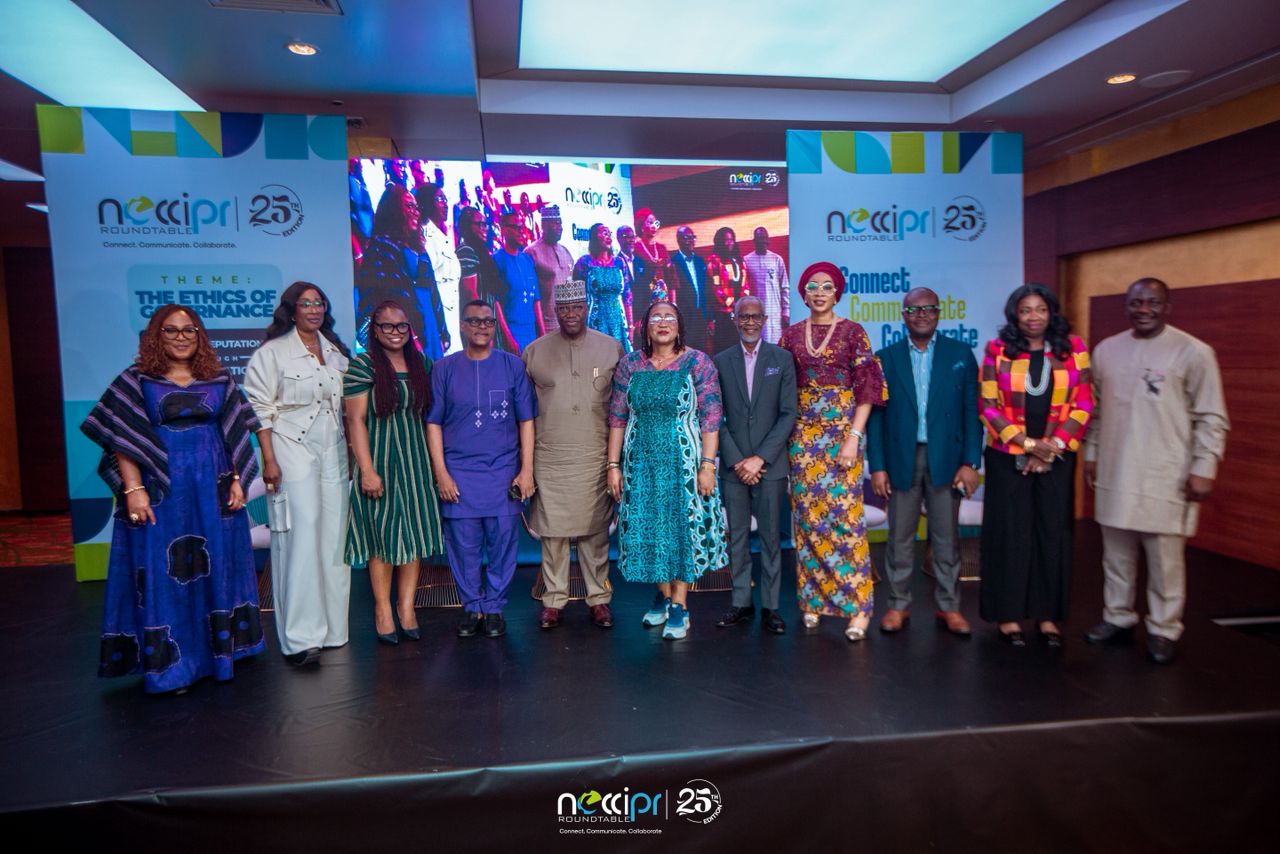
Channels Media Group Chairman Dr. John Momoh (OON).
Channels Media Group Chairman Dr. John Momoh (OON) reminded Nigerian leaders and communication professionals that true leadership and effective governance thrive only where trust exists.
Speaking at the 25th edition of the NECCI Public Relations Roundtable in Lagos, he emphasised that without ethics, transparency, and accountability, no amount of publicity can repair a nation’s credibility.

Moreover, Momoh insisted that rebuilding national credibility requires more than words, it demands ethical conduct, consistent truth-telling, and empathy-driven leadership.
Trust Deficit: Nigeria’s Unspoken Crisis
First, Momoh painted a sobering picture of a nation struggling with disillusionment and scepticism.
He observed that for many Nigerians, government promises have become synonymous with disappointment.
“Ask ten people on the streets of Lagos if they trust the government; more than half will sigh,” he noted pointedly.

Consequently, this erosion of trust has created a credibility vacuum that undermines governance, national reputation, and policy success.
“Trust is the currency of leadership,” he said. “Without it, policies fail, investors flee, and citizens disconnect.”
Ethics, Transparency, and Accountability: The Missing Links in Governance
Furthermore, Momoh underscored that ethical governance remains the bedrock of enduring credibility

“Ethics means doing the right thing, not the convenient thing,” he asserted. “It’s transparency , letting the light shine on decisions. It’s accountability owning outcomes, good or bad.”
He recalled Nigeria’s 2014 Ebola response as a shining example of ethics in governance.
There was clear communication, honest updates, and collaboration; therefore, people trusted the process and Lagos became a global case study. That, he said, is leadership rooted in truth.
“PR Is Not Perfume for Bad Policy” Momoh Challenges Practitioners
Shifting to the practice of public relations, Momoh issued a candid challenge to both practitioners and policymakers.
“PR is not perfume for bad policy; it’s principle. It’s the conscience of communication,” he declared.
He criticised the growing tendency of institutions to use PR merely as a tool for image-laundering.
Instead, he argued, real PR occurs before a crisis and not only after one.
In short, it requires listening before talking, engaging before announcing, and standing for truth before convenience.
Fuel Subsidy Removal: How Communication Broke the Public’s Trust
To illustrate his point, Momoh cited the fuel subsidy removal policy as a key example of how poor communication can erode public trust.
He explained that the backlash that followed was not primarily about the policy itself, but about how it was introduced.
People woke up shocked and felt blindsided; therefore the anger was not simply about economics, it was about trust.
By contrast, he praised Lagos State’s approach during the COVID-19 pandemic: through transparent briefings and consistent data sharing, authorities built confidence.
People grumbled, but they followed because they believed the messenger. That demonstrates the power ethics brings to communication.
Rebuilding Credibility: Five Ethical Imperatives
Moving from diagnosis to action, Momoh offered five ethical imperatives that can guide leaders and communicators in restoring trust and rebuilding reputation:
1. Listen Before You Speak
Government must start by listening because listening humanises authority.
2. Tell the Truth, Even When It Hurts
Nigerians can handle bad news; what they cannot handle is being deceived.
3. Show Impact, Not Intention
Don’t promise, prove. When citizens see results, they begin to believe again.
4. Humanise Leadership
Empathy builds trust. Dora Akunyili’s honesty, for example, became her trusted brand.
5. Admit Mistakes and Fix Them
Humility is power. When leaders admit errors and correct them, they earn respect.
Collectively, these steps underscore that ethical governance is not abstract philosophy; rather, it is actionable, measurable, and transformative.
The PR Community Must Be the Conscience of Governance
Accordingly, Momoh called on the public relations community to reclaim its moral and ethical authority in shaping Nigeria’s governance culture.
“We must not be decorators of image but defenders of integrity,” he stated.
He urged the profession to ensure that the Nigeria Institute of Public Relations (NIPR) is remembered as the body that told truth to power, respectfully, consistently, and fearlessly.
In this way, the NECCI PR Roundtable’s 25th anniversary becomes not merely a milestone but a call to moral renewal.
A Call to Rebuild Nigeria on the Pillars of Truth and Trust
In closing, Momoh painted a stirring vision of a Nigeria anchored on ethical governance and credible communication.
“Imagine a Nigeria where government statements are believed because they’ve earned that belief; where transparency is the rule, not the exception; and where PR is not spin but service,” he said.
Ultimately, his final reminder resonated across the hall: “When governance is ethical and communication is genuine, reputation takes care of itself. Ethics plus truth equals reputation that endures.”
Through his address, Dr. John Momoh did more than critique current practice; he offered a roadmap, and a moral challenge for leaders and communicators to restore trust, rebuild reputation, and renew the social compact between government and citizens.






Comment
No comments found.